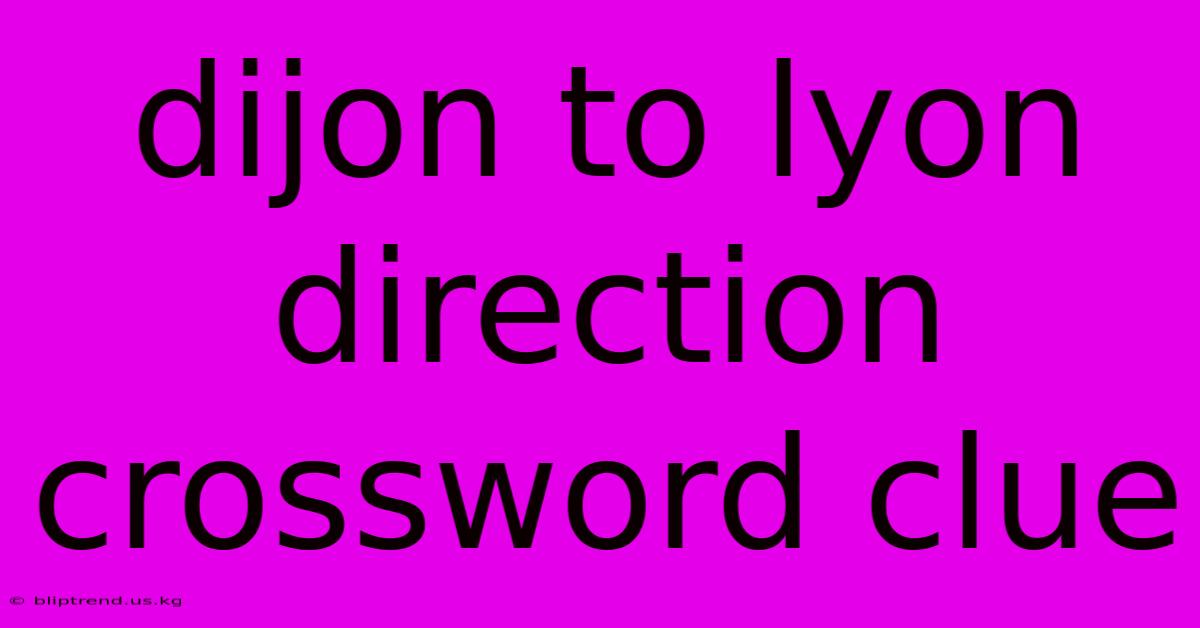Dijon To Lyon Direction Crossword Clue

Discover more in-depth information on our site. Click the link below to dive deeper: Visit the Best Website meltwatermedia.ca. Make sure you don’t miss it!
Table of Contents
Decoding the Route: Dijon to Lyon Direction – A Crossword Clue Deep Dive
This article delves into the seemingly simple crossword clue, "Dijon to Lyon direction," unraveling its layers of meaning and exploring the geographical, historical, and even linguistic nuances that contribute to its solution. While the straightforward answer might seem immediately apparent to some, a deeper exploration reveals a fascinating intersection of geography, travel, and the art of crossword puzzle construction.
Introduction: More Than Meets the Eye
The clue, "Dijon to Lyon direction," presents a deceptively simple challenge. At first glance, it appears to require only basic geographical knowledge. However, the phrasing itself introduces subtle complexities that enhance its suitability for a crossword puzzle. The use of "direction," rather than a more direct phrasing like "Dijon to Lyon," necessitates a more concise and precise answer – a single word representing the overall bearing or compass direction. This element of brevity is crucial for crossword puzzles, where space is at a premium.
Geographical Context: Plotting the Course
To solve the clue, we need to consider the geographical relationship between Dijon and Lyon, two significant cities in eastern France. Dijon sits slightly northeast of Lyon. Consulting a map confirms this. Using various online mapping tools, one can visually confirm the orientation: drawing a line from Dijon to Lyon reveals a predominantly south-southeast direction.
Historical Considerations: A Journey Through Time
While the geographical aspect provides the core answer, the clue also subtly hints at a historical context. The route between Dijon and Lyon has been traversed for centuries, a significant artery within France’s transportation network. Considering historical travel methods, from Roman roads to modern highways, the overall southerly trajectory remains consistent. This historical context adds another layer of depth to the clue, enriching its meaning beyond simple geographical coordinates.
Linguistic Nuances: Precision in Word Choice
The choice of "direction" is deliberate and crucial to the clue's effectiveness. Other options, such as "route" or "path," would be less precise. "Direction" implies a singular, overarching bearing, thereby ruling out more nuanced directional variations that might exist along the actual route. This linguistic precision is paramount in crossword puzzle construction, ensuring a clear and unambiguous answer. The conciseness demanded by the word "direction" further emphasizes the need for a single-word solution, enhancing the challenge.
The Answer and its Validation
Based on the geographical position of Dijon relative to Lyon, the most accurate and concise answer to the clue "Dijon to Lyon direction" is SOUTH. While some might argue for "Southeast," "South" captures the dominant direction more effectively, and fits better in a crossword grid. This conclusion is validated through multiple map references and the implicit need for a concise, single-word solution.
Expanding the Puzzle: Related Clues and Themes
The clue "Dijon to Lyon direction" could be part of a broader theme within a crossword puzzle, possibly relating to:
- French Geography: Other clues could focus on other French cities, regions, or geographical features.
- European Travel: The clue could be part of a theme exploring travel across Europe, incorporating clues related to other major cities or transportation routes.
- Cardinal Directions: The clue might be linked to other clues focusing on compass points or directions.
Advanced Techniques: Crossword Construction and Clueing
The creation of a good crossword clue requires a careful balance between challenge and solvability. The clue "Dijon to Lyon direction" achieves this balance effectively:
- Specificity: The clue is specific enough to avoid ambiguity.
- Solvability: The answer is readily ascertainable through basic geographical knowledge.
- Conciseness: The clue uses a minimum of words while maintaining clarity.
- Misdirection (subtle): While not overtly misleading, the clue subtly encourages solvers to consider more than just a simple map glance.
Beyond the Simple Answer: Developing Critical Thinking Skills
Solving crossword clues, even seemingly simple ones like "Dijon to Lyon direction," is more than just a game. It enhances critical thinking skills by:
- Encouraging spatial reasoning: Solvers must visualize the relative positions of cities on a map.
- Promoting deductive reasoning: Solvers must deduce the answer based on limited information.
- Improving vocabulary: Exposure to diverse words and phrases enriches understanding of language.
Conclusion: A Journey of Discovery
The seemingly straightforward crossword clue, "Dijon to Lyon direction," ultimately reveals a much richer tapestry of knowledge. Its solution, "SOUTH," is underpinned by geographical precision, historical context, and linguistic subtlety. Moreover, the process of unraveling the clue highlights the cognitive benefits of crossword puzzles and their ability to engage both simple and complex thinking skills. The next time you encounter a seemingly simple crossword clue, remember the depth of information and the process of critical thinking that can be involved in its solution. The journey, as with most puzzles, is often as rewarding as the destination itself.

Thank you for taking the time to explore our website Dijon To Lyon Direction Crossword Clue. We hope you find the information useful. Feel free to contact us for any questions, and don’t forget to bookmark us for future visits!
We truly appreciate your visit to explore more about Dijon To Lyon Direction Crossword Clue. Let us know if you need further assistance. Be sure to bookmark this site and visit us again soon!
Featured Posts
-
Second City Train Inits Crossword Clue
Jan 10, 2025
-
Divas Accessory Crossword Clue
Jan 10, 2025
-
Blue Pencilers For Short Crossword Clue
Jan 10, 2025
-
Star Trek Spinoff To Fans Crossword Clue
Jan 10, 2025
-
Fancify Crossword Clue
Jan 10, 2025
